West Virginia is known as duck-hunting country. Waterfowl hunters have a great time hunting in West Virginia for several reasons, including the state’s lack of restrictions. Ducks are prevalent in different areas, though it requires effort to track them down. However, it does offer some excellent duck hunting, if you know where to go.
What Types of Ducks Are in West Virginia?
West Virginia is a great place for duck hunters. Not only do hunters have little competition, but there are also numerous duck species that call West Virginia home, including:
Mallard
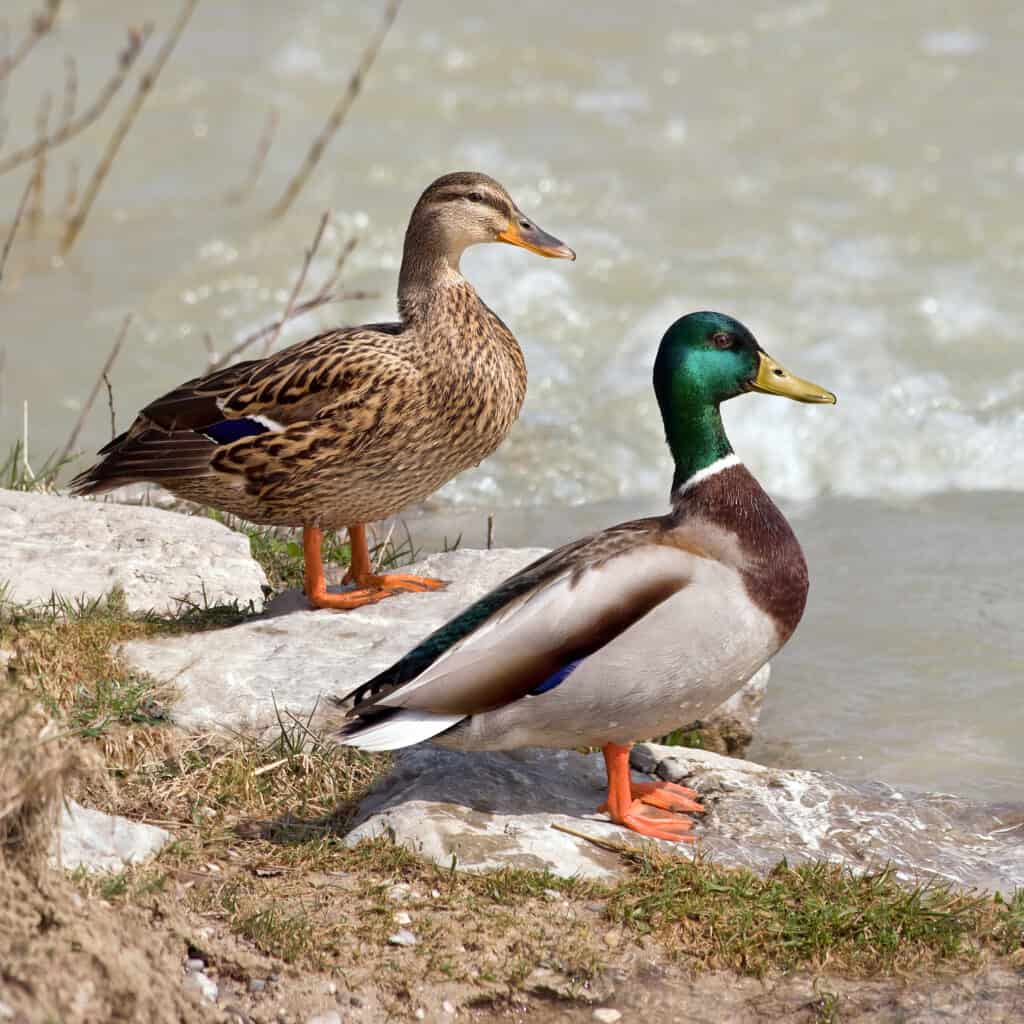
You can hunt mallard ducks in West Virginia.
©This picture was realized by Richard Bartz by using a Canon EF 70-300mm f/4-5.6 IS USM Lens, CC BY-SA 2.5 <https://creativecommons.org/licenses/by-sa/2.5>, via Wikimedia Commons – License
The mallard is an example of a duck you can find all year in West Virginia. Mallards are a favorite for waterfowlers due to their availability. They are most common in the area during winter, with smaller numbers in summer.
Gadwall
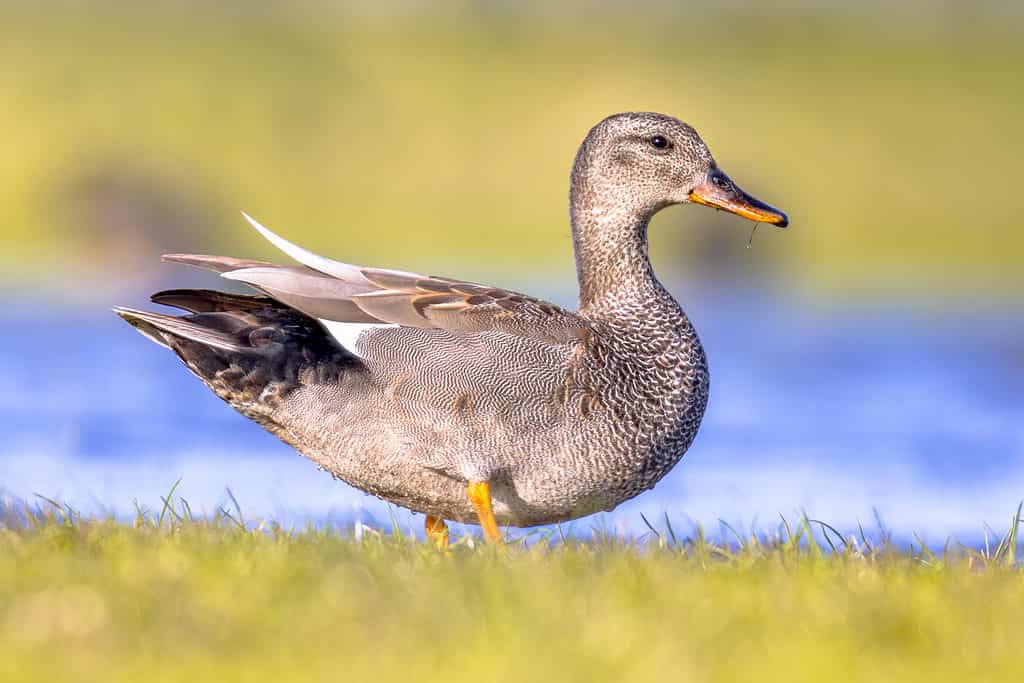
Gadwall ducks are easy to spot from September to May.
©Rudmer Zwerver/Shutterstock.com
Duck hunters in West Virginia should also look out for the gadwall. These large ducks are easy to spot due to their coloring, which includes a dark-brown head. They are most visible in the state from September to May.
American Wigeon
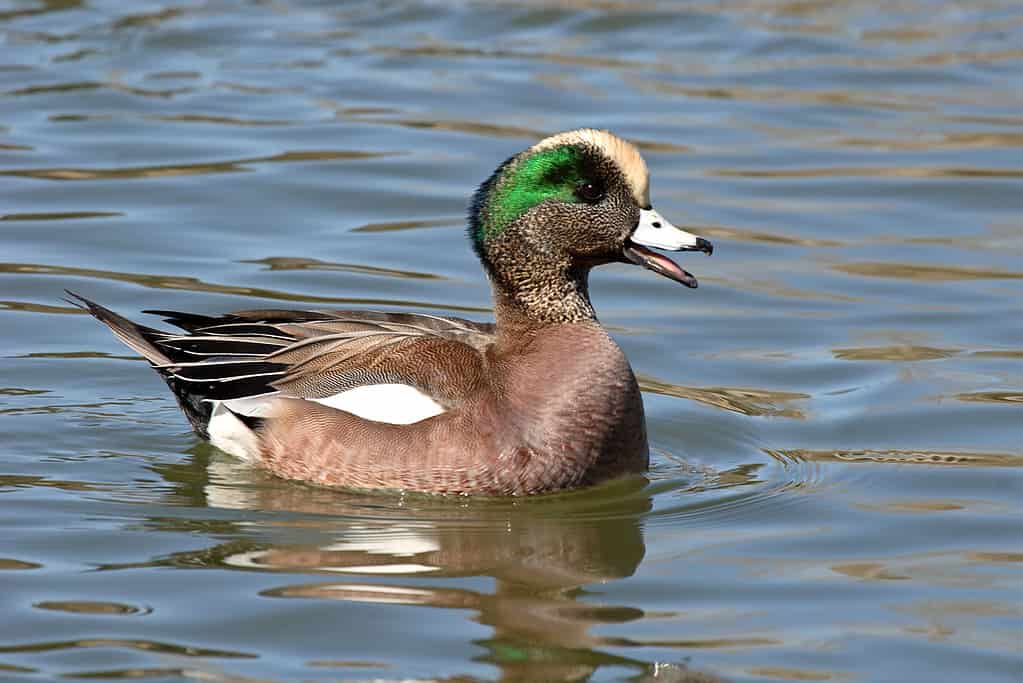
Winter is the best time to hunt American wigeon in West Virginia.
©iStock.com/gatito33
Waterfowlers can check out the American wigeons, tiny ducks that have green stripes on their side. The American wigeon prefers feeding on vegetation, both on land and in the water. Winter is the best time to hunt for them in West Virginia.
Wood Duck
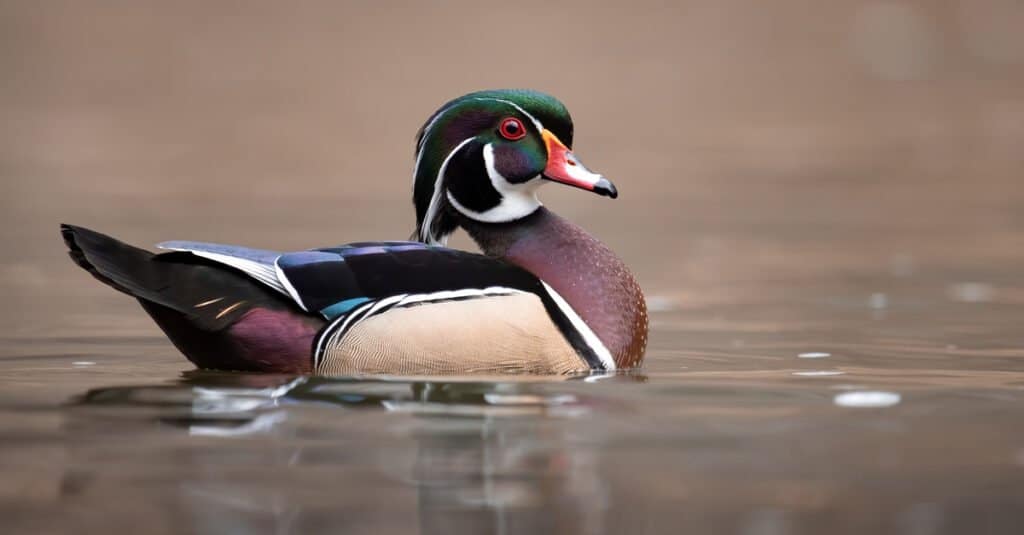
These ducks are most prevalent in the water during summer.
©Harry Collins Photography/Shutterstock.com
Wood ducks, known for their fantastic hairdos, have a checkerboard of colors with striking green heads. Hunters can find them yearly in West Virginia, with higher numbers during summer.
Bufflehead
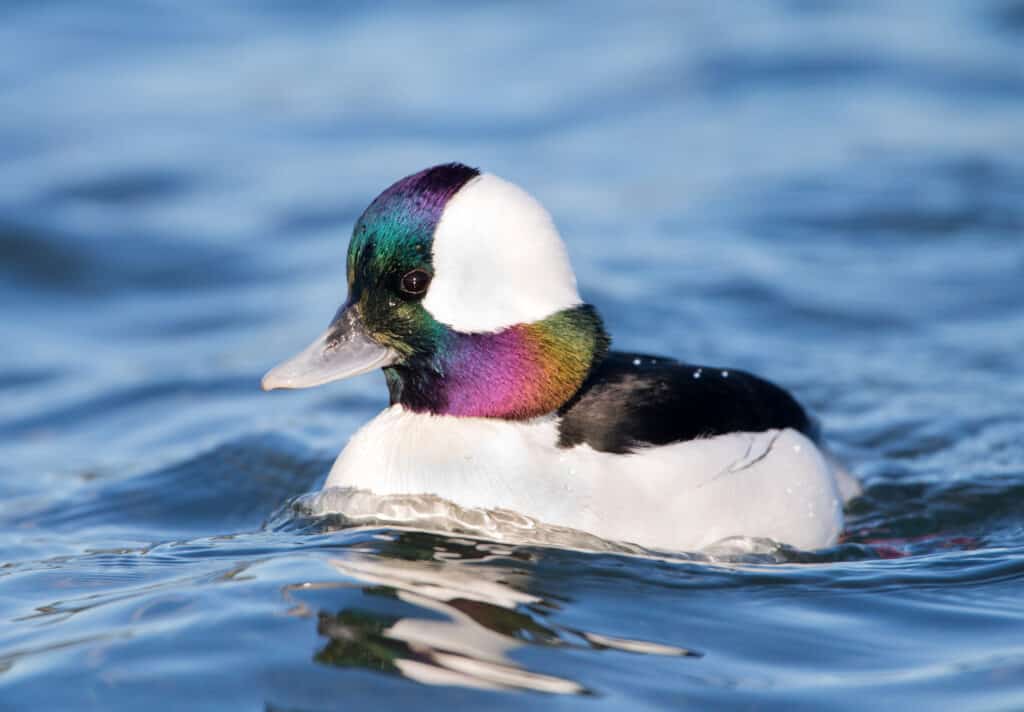
Bufflehead ducks are common during winter.
©Birdiegal/Shutterstock.com
Another small duck found in West Virginia is the bufflehead. This tiny duck has a bulbous head. Males have a white patch on their heads and look different from females. They’re most common from October to April.
Ring-Necked Duck
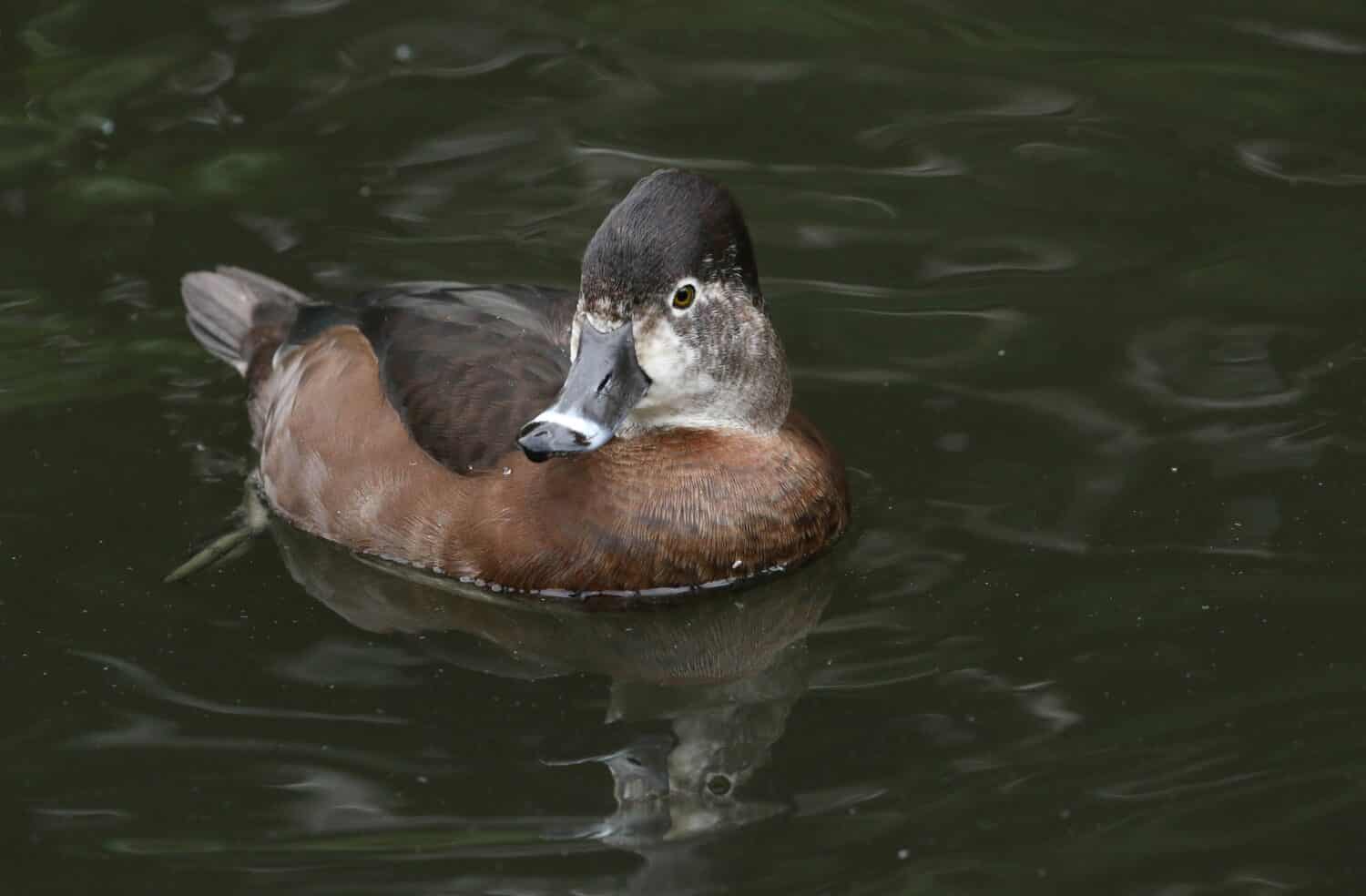
Ring-necked ducks are common during winter and a bit of summer.
©Sandra Standbridge/Shutterstock.com
Hunters should be prepared to put extra effort into spotting the ring-necked duck. The medium-sized duck enjoys spending time in the state during winter and a bit in summer but can be elusive. Both males and females have a cinnamon ring around their necks and blackheads.
Where Can Waterfowlers Hunt Ducks in West Virginia?
Hunting waterfowl in West Virginia requires finding the right spots to do so. Thankfully, the state has private and public duck hunting areas. While West Virginia isn’t on the flyway for migratory birds, excellent duck hunting areas are still available.
The Stonewall Jackson Wildlife Management Area is the first place you want to check out when duck hunting. It’s in Lewis County and covers 18,298 acres. The good news is there’s less hunting pressure in this area. It has a first-come, first-serve policy.
Next, head over to Bluestone Lake Wildlife Management Area. It’s a popular place for hunters seeking turkeys and deer. However, it’s still a good option for duck hunting since it has a 15-acre waterfowl mash.
In addition, the Pleasant Creek Wildlife Management Area is a good duck hunting spot with a suitable habitat. The area has about 60 acres of marshland attractive to waterfowl and is a zone 2 property.
Also, check out Green Bottom Wildlife Management Area, a zone 1 property. It covers 1,096 acres, most of which is marshland and swampy.
Lastly, waterfowlers can head to McClintic Wildlife Management Area in Mason County. It has a splendid variety of habitats, including wetlands covering 180 acres. There are also over 30 ponds home to a huge duck population. It’s a zone 1 property also home to thousands of geese yearly.
West Virginia Hunting Zones
West Virginia has two hunting zones: zone 1 and zone 2. Each zone covers certain counties, so always check out the location beforehand.
Season Dates for Duck Hunting in West Virginia
| Species | Open Seasons |
|---|---|
| Ducks and Coots (3-way split season) | Oct 1 to Oct 14 Nov 7 to Nov 12 Dec 23 to Jan 31 |
Other Season Dates
| Species | Open Seasons |
|---|---|
| Youth Waterfowl | Sept 17 Nov 5 |
| Gallinules | Oct 1 to Oct 14 Dec 7 to Jan 31 |
| Scaup | Oct 1 to Oct 14 Nov 7 to Nov 12 Dec 23 to Jan 11 Jan 12 to Jan 31 |
West Virginia Daily Bag and Possession Limits
It’s crucial to note the daily bag and possession limits in West Virginia. In this state, waterfowlers hunting ducks have a daily bag limit of six.
Note if any restrictions apply to the number for each species. For example, waterfowl hunters in West Virginia must stick to no more than two canvasbacks, one pintail, two mallards (one male and one female), three wood ducks, two black ducks, three long-tailed ducks, and two redheads.
| Species | Daily Bag Limits | Possession Limits |
|---|---|---|
| Ducks | 6 | 18 |
| Coots | 15 | 45 |
Shooting Hours in West Virginia
Shooting hours vary across the state. Hunters can shoot from noon to sunset on September 1, marking the start of the season. However, they can only shoot 30 minutes before sunrise to sunset for the remainder of the season.
It’s best to be up early and aim for sunrise hunting. At this time, ducks and other waterfowl are easier to hunt.
What Type of Gear Do You Need to Hunt Ducks in West Virginia?
Duck hunting in West Virginia is mostly in wetlands and marshlands with shallow water. The best way to navigate such habitats is to invest in a pair of waders. In addition, you can bring your boat and work on setting up a blind while on the water.
Fortunately, some blinds set up in each wildlife management area benefit hunters. Below is some necessary gear for successful duck hunting in West Virginia:
Camouflage
It’s important to remain invisible when hunting ducks. That’s why each hunter needs camouflage. Always think of the places you intend to hunt and get the right camo that suits it.
Guns
Invest in the right guns for a successful hunt. For example, a hunter can choose a 12 or 20-gauge shotgun. Bring along a gun bag or case and 3” shells. There are other shell options, but it depends on your needs, and make sure they are non-toxic.
Boat/Duck Blind
Next, invest in quality boats or duck blinds, or both. Some wildlife management areas have blinds set up for duck hunters. Each hunter must enter a drawing to get permission to access the blinds annually.
However, you can also buy a commercial blind or build one at home to take on the hunt. There’s also the option of a boat blind.
Callers
Duck callers are crucial items to have when hunting. Also, you can master different duck calls to make hunting a more effortless experience. That way, you can attract more ducks each hunting season. Carry different callers, if possible, for each spot you pick.
Duck Decoys
Find the best duck decoys to attract more ducks each season. They look realistic and won’t spook waterfowl if you spread them well.
What are the Safety Measures for Hunting Ducks in West Virginia?
Below are some of the safety items to have with you when hunting:
Boots and Waders
Sometimes, you want to leave the boat and wade in the shallow waters. Invest in good quality boots and waders to protect your feet.
First Aid Kit
Accidents happen. Have a first aid kit with you at all times when duck hunting.
Life Vest
Camo life vests are lightweight and perfect for waterfowl hunters.
Tips for Success Hunting Ducks in West Virginia
Successful duck hunting depends on how prepared a hunter is each season. There are some tips you can follow to have the best experience. For instance, check out waterfowl reports for each area to pick the right hunting season.
In addition, be ready to fight with ice when hunting during winter. One way to do so is by creating open spaces in the water for the ducks. Find spots where ice is easier to break into huge chunks and move them away.
Next, patience and calmness will bring better results. They can spook easily, leading to a frustrating hunting experience.
Lastly, always do a wind check during each hunt. The direction of the wind can help you when positioning blinds and decoys.
The photo featured at the top of this post is © 2009fotofriends/Shutterstock.com
Thank you for reading! Have some feedback for us? Contact the AZ Animals editorial team.







